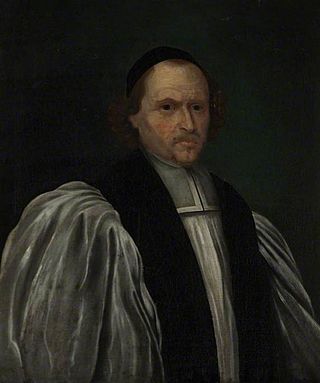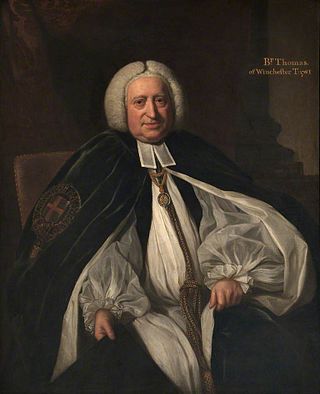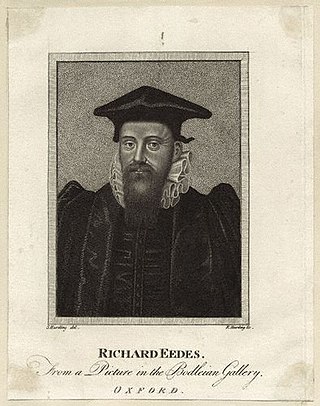Related Research Articles

William Juxon was an English churchman, Bishop of London from 1633 to 1646 and Archbishop of Canterbury from 1660 until his death.

John Dolben (1625-1686) was an English priest and Church of England bishop and archbishop.
William Fuller (1608–1675) was an English churchman.

John Piers (Peirse) was Archbishop of York between 1589 and 1594. Previous to that he had been Bishop of Rochester and Bishop of Salisbury.

John Gilbert was Archbishop of York from 1757 to 1761.

Francis Bird (1667–1731) was one of the leading English sculptors of his time. He is mainly remembered for sculptures in Westminster Abbey and St Paul's Cathedral. He carved a tomb for the dramatist William Congreve in Westminster Abbey and sculptures of the apostles and evangelists on the exterior of St Paul's, a memorial to William Hewer in the interior of St Paul's Church, Clapham as well as the statue of Henry VI in School Yard, Eton College. Despite his success, later in life Bird did little sculpting. He had inherited money from his father-in-law and set up a marble import business.

John Prideaux was an English academic and Bishop of Worcester.

Humphrey Henchman (1592–1675) was a Church of England clergyman and bishop of London from 1663 to 1675.

William Piers was Vice-Chancellor of Oxford University from 1621 to 1624, Bishop of Peterborough from 1630 to 1632 and Bishop of Bath and Wells from 1632 until the abolition of episcopacy in 1646, then again from the Restoration in 1660 to his death in 1670.

John Thomas was an English bishop.

John Fisher was a Church of England bishop, serving as Bishop of Exeter, then Bishop of Salisbury.
William Jane (1645–1707) was an English academic and clergyman, Regius Professor of Divinity at Oxford from 1680.
William Creed (1614?-1663) was an English clergyman and academic, Regius Professor of Divinity at Oxford from 1660.

Richard Edes (1555–1604) was an English churchman. He became Dean of Worcester, and was nominated one of the translators for the Authorised King James Version, in the Second Oxford Company, but died in the earliest stages of the project.
William Chedsey (1510?–1574?) was an English Roman Catholic priest and academic, who became archdeacon of Middlesex in 1556 and President of Corpus Christi College, Oxford in 1558.
William Master (1627–1684) was an English divine and writer. He was the son of the politician Sir William Master and the brother of John Master.

Edward Parry was Church of Ireland Bishop of Killaloe, County Clare, Ireland from 28 March 1647 until his death 20 July 1650.
John Reading (1588–1667) was an English priest of Calvinist views and Biblical commentator.
Thomas Triplett (1602–1670) was an English churchman and teacher, a Canon at Westminster Abbey from 1662 and by his death in 1670 Sub-Dean there. Triplett was a schoolmaster in Hayes, Middlesex during the Commonwealth period, when cathedrals and canonries were abolished; there is a school in Hayes named after him.
Anthony Hawles DD was a Canon of Windsor from 1660 to 1664 and Archdeacon of Salisbury.
References
- 1 2 3 4 5
 This article incorporates text from a publication now in the public domain : Lee, Sidney, ed. (1899). "Wall, John (1588–1666)". Dictionary of National Biography . Vol. 59. London: Smith, Elder & Co.
This article incorporates text from a publication now in the public domain : Lee, Sidney, ed. (1899). "Wall, John (1588–1666)". Dictionary of National Biography . Vol. 59. London: Smith, Elder & Co. - ↑ Cole, J. C. "William Byrd, Stonecutter and Mason" (PDF). Oxoniensia. 14: 63–74.
